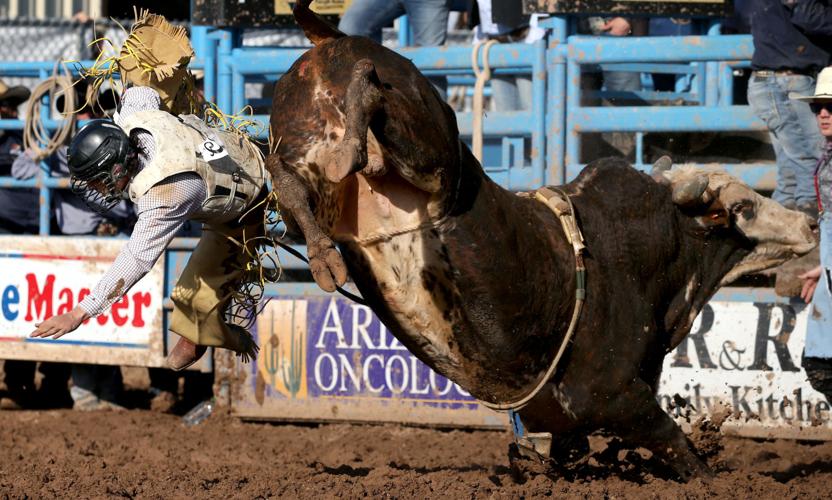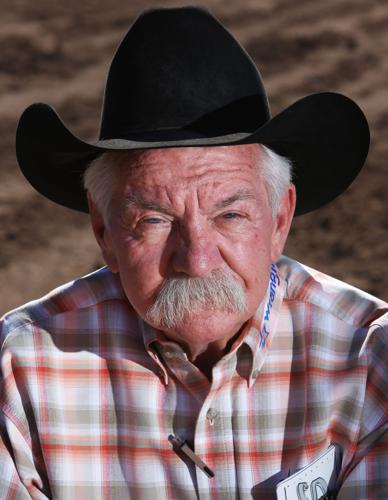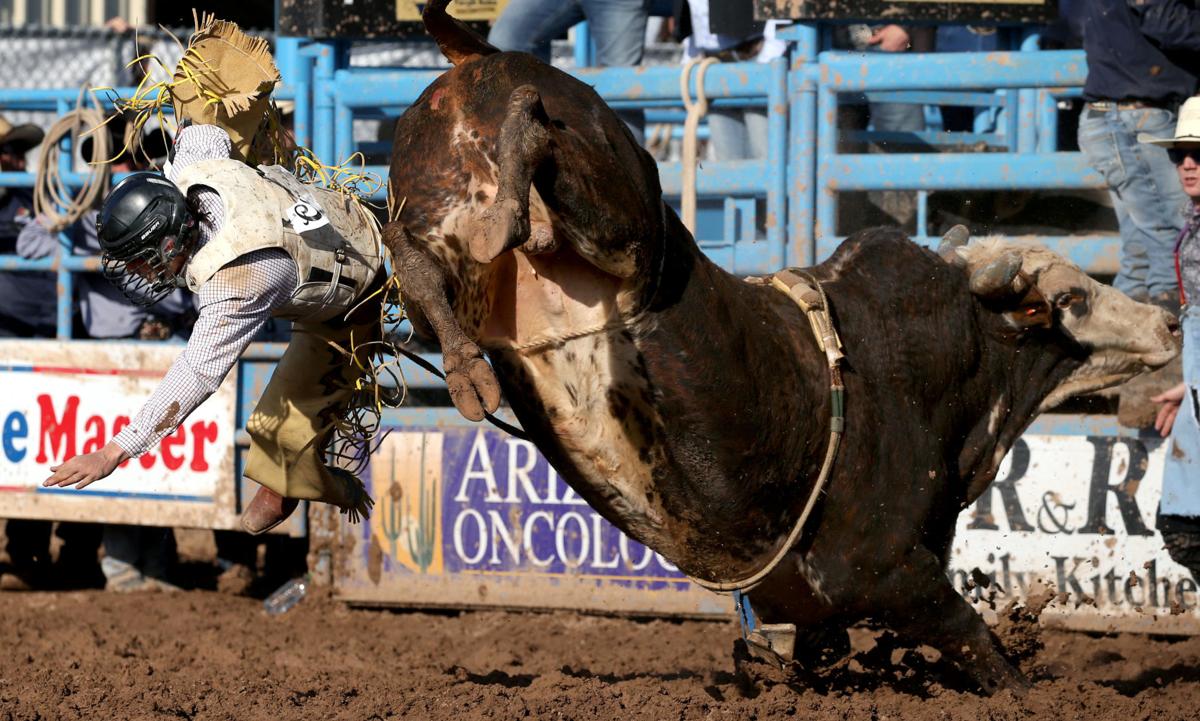For the first time in its 95-year history, La Fiesta de los Vaqueros is canceled.
Tucson Rodeo organizers announced Thursday that the event, scheduled for February, will not take place because of the coronavirus pandemic. The decision was made "as we have learned more about the medical realities of the COVID-19 pandemic and the logistical realities of social distancing within the context of our rodeo," event officials said in a news release. A decision on the Tucson Rodeo Parade, another annual tradition, is expected early next week.
The rodeo relies on ticket sales to fund prize money given to the event's winners. To break even, the rodeo needs to draw an average of 7,700 fans per session to its 11,000-seat arena, said Gary Williams, Tucson Rodeo's general manager. Pima County Health Department regulations would have capped attendance at 2,200 fans per session.
"We would lose hundreds and hundreds of thousands of dollars," Williams said. "With the livestock and the announcer, our costs are fixed, whether there's 2,000 people or 11,000 people in the stands."
Even if the rodeo could break even financially, the logistics would have been a nightmare. Williams said he would've had to cut the number of vendors by half in order to account for social distancing. Fans would have been forced to move in one direction around the arena and space out in the grandstands. It's unclear whether food and drink sales, both major money-makers, would have been allowed.
Mostly, though, rodeo organizers were concerned that out-of-state competitors and vendors could expose locals to the virus. The rodeo draws between 600 and 700 contestants from throughout North America every year, and they often interact closely with fans in the stands.
Williams said his biggest fear was that an asymptomatic cowboy would give the virus to a fan, who would then become sick or die. Allowing that to happen "would be unconscionable on our part," he said.

Gary Williams
Instead, rodeo officials will focus on preparing for the 2022 event. Williams said members of the rodeo committee will soon turn their attention to a handful of improvements that they've been too busy to tackle in the past. They plan to re-do the drainage system in the arena and haul in more dirt, among other things.
"What's very important is that we're going to keep them engaged," Williams said. "We're not going away; this (event) isn't going away."
The decision to cancel the rodeo will affect Tucson financially. Rodeo officials say their event has an annual financial impact of more than $15 million. in 2020, the Tucson Rodeo Committee donated $250,000 to charities.
The rodeo is the latest in a line of local events to be canceled because of the pandemic.
Tucson’s Winterhaven Festival of Lights will not take place after the city and county deemed it unsafe.
The Tucson Gem & Mineral Show, hosted every January and February at the Tucson Convention Center, was called off last month. Hosted by the Tucson Gem and Mineral Society since 1955, the main show at the TCC is considered the largest, oldest and most prestigious gem and mineral show in the world.
The Arizona Wildcats are playing football and basketball games, but without fans in the stands and with mixed results. Last week's football opener at Utah was canceled after Utes players tested positive for the virus. The American Hockey League's Tucson Roadrunners are targeting a February return to the ice, but it's unclear whether fans will be allowed inside Tucson Arena. The same goes for the Indoor Football League's Tucson Sugar Skulls, who are expected to start their season March.
The Cologuard Classic, a PGA Tour Champions event scheduled for Feb. 21-28 at the Omni Tucson National Resort, is still a go.
Founded in 1925, the Tucson Rodeo — and its accompanying parade, held the Thursday of "Rodeo Week" — has been a Tucson tradition. The event has taken place every year since. Only once, in 1943, was there a hiccup. That year, the rodeo grounds were being used to house soldiers from Davis-Monthan Air Force Base during World War II. The Tucson Jaycees, the group that used to run the rodeo, announced plans to move the event to a plot of land across from the old El Conquistador Hotel. Tucson's chamber of commerce allowed the event to move for one year, but said it would need a different name.
"Most of the committee was involved in putting it on," Williams said. "It wasn't called the Tucson Rodeo, but it still was the February rodeo in Tucson."
Photos: La Fiesta de los Vaqueros Tucson Rodeo through the years

Little Cowpunchers riding in the 1938 Tucson rodeo parade. Victor Aros is in the front, left. Pete Aros is standing in the middle, the only one without a cowboy hat. Photo courtesy of Victor Aros.

1948 rodeo at Tucson Rodeo Grounds on South Sixth Ave.

Roping action at La Fiesta de los Vaqueros Tucson Rodeo in 1949.

Tucson Citizen newsboys distribute newspapers at the 1951 rodeo parade.

Rodeo parade spectators fill the streets at Stone and Alameda in 1951.

A couple of cowboys participate in a wild horse race during the 1961 La Fiesta de los Vaqueros. A three-man team tries to control a wild horse long enough to put a saddle on its back. Then one of the team members has to ride it, usually across a finish line. Tucson Citizen file photo

A bull rider crawls away from a bull, most likely as fast as he can during the 1961 La Fiesta de los Vaqueros. Photo by Bruce Hopkins / Tucson Citizen

With a firm grip, a steer wrestler brings his steer to a stop during the 1963 La Fiesta de los Vaqueros. Tucson Citizen file photo

Dick Pttman hangs on during bronc riding at the Tucson Rodeo in 1971.

Competitors for the bushiest beard of the 1971 La Fiesta de los Vaqueros. The Grand Prize winner was Joe Lowry, at right.

The 1972 La Fiesta de los Vaqueros rodeo.

Legendary rodeo photographer Louise Serpa photographed Dee Dunning on a bull during the La Fiesta de los Vaqueros Tucson Rodeo in 1972.

John Kowskal holds on tight to his horse during the La Fiesta de los Vaqueros Tucson Rodeo in 1973.

A bull rider makes a quick exit off his ride during the La Fiesta de los Vaqueros Tucson Rodeo in 1973.

A barrel racer's hat flies off while making the turn during the La Fiesta de los Vaqueros Tucson Rodeo in 1974.

Rodeo clown Quail Dobbs takes the fast way out of the arena during the La Fiesta de los Vaqueros Tucson Rodeo in 1974.

A.R. Young wallows in the mug after throwing a calf during steer wrestling in 1983.

Kelly Tierney of South Dakota makes a turn during barrel racing during the La Fiesta de los Vaqueros Tucson Rodeo in 1984.

A rodeo clown distracts a bull after throwing its rider during the La Fiesta de los Vaqueros Tucson Rodeo in 1984.

Wade Leslie gets tossed around like a rag doll while on a bull in his event on March 2, 1986 during La Fiesta de los Vaqueros. Photo by Xavier Gallegos / Tucson Citizen

Rodeo clown Ted Kimzey fishes from a raft in the middle of the rodeo area during the La Fiesta de los Vaqueros Tucson Rodeo in 1987.

Tate Wyly ropes his buddy Casey Simon during the La Fiesta de los Vaqueros Tucson Rodeo in 1989.

Quadrille de Mujeres stand before the crowd during the La Fiesta de los Vaqueros Tucson Rodeo in 1990.

A steer throws a cowboy during La Fiesta de los Vaqueros in 1996.

Bullfighter Rob Smets smiles after being thrown from a bull at the Fiesta de Los Vaqueros rodeo in 1998.

Bull rider Robbie Miller is underneath the bull, Gator, as he is being after being knocked off of the fence as he was trying to escape the bull in 1998. The man in the yellow coat in the ring was trying to come to the aid of Robby but there was nothing he could really do at this point but try and distract him.

Rusty Hamilton from Capitan, New Mexico takes down a steer during steer wrestling on the fourth day of the La Fiesta de los Vaqueros rodeo in 1998.

Doug Forzani gets a lift from a bull during the Wrangler/Western Warehouse Bullfight contest at the 75th Annual Tucson Rodeo in 2000.

Craig Hicks leaps from his horse and onto a calf during the Steer Wrestling competition at the 79th Annual Tucson Rodeo in Tucson, Arizona on Sunday Feb. 22, 2004.

Rodeo photographer Louise Serpa stands among many of her rodeo photographs at her home on Tuesday, February 8, 2005.

Nathan Klassen tries his best to get away from 'Getcha Some' during the 81st annual La Fiesta De Los Vaqueros at the Tucson Rodeo Grounds on February 18, 2006.

Lindz Sears of Ropesville, Texas, goes around the third barrel in the Women's Barrel Race at the Tucson Rodeo finals, Sunday, Feb. 24, 2008.

B.J. Schumacher gets booted from 'Undertow' in the bull riding competition during the 83rd Annual Tucson Rodeo, Friday, February 22, 2008.

Saddle Bronc rider Heith DeMoss prepares for the finals on a horse named Night Latch at the Tucson Rodeo finals, Sunday, Feb. 24, 2008.

Mutton Busting competitors put on their game faces prior to competing at the Fiesta de Los Vaqueros Feb. 27, 2010 at the Tucson Rodeo Grounds.

Luke Butterfield hangs onto the rail as his horse rares-up in the shoot before heading out into the arena Saturday, February 20, 2010 during the Saddle Bronc Riding event.

Saddle bronc rider Cody Wright has trouble with his first re-ride horse, Many Bubbles, as it rears up in the chute at the end of the performance at La Fiesta de los Vaqueros on Friday, February 26, 2010.

Olin Hannum of Malad, Idaho, steer wrestles in a time of 5.4 seconds at the Tucson Rodeo, Friday, Feb. 25, 2011.

Hunter Herrin comes off of his horse and during the Tie-Down Roping event of the 86th annual La Fiesta de los Vaqueros Tucson Rodeo on Sunday, February 20, 2011.

Caleb Bennett hangs on during the bareback riding competition at the 87th Annual Tucson Rodeo on Thursday, Feb. 23, 2012.

Beau Clark hides through the dirt and during the slack Steer Wrestling competition in 2012.

The Lunderville family heading to get the girls' horses for them to ride in the competition. From left to right: Melisa, mom; Dylan, 6; Peyton, 8; Taylor, 11; Chad, father; in 2013.

Chance Campbell, coming off his horse and onto the steer during the Steer Wrestling event at the Tucson Rodeo, La Fiesta de los Vaqueros, Sunday February 24, 2013, in Tucson, Arizona. Photo by Benjie Sanders/Arizona Daily Star

Monty Lewis, roping the steer and getting ready to come off his horse to tie it down in the Tie-Down Roping event during the Tucson Rodeo, La Fiesta de los Vaqueros, Sunday February 24, 2013, in Tucson, Arizona. Photo by Benjie Sanders/Arizona Daily Star

Wyatt Hancock of Taylor, Ariz., comes charging out of the chute riding Beatrice during the fifth performance at La Fiesta de los Vaqueros at the Tucson Rodeo Grounds. The photo was taken on Saturday, February 22, 2014, in Tucson, Ariz. Photo by A.E. Araiza/ Arizona Daily Star

Tray Chambliss, from Alpine, TX, keeps a hold onto his horse, One-Eyed Jack, as he competes in the bareback riding event during the 89th Annual Tucson Rodeo at the Tucson Rodeo Grounds. Photo taken Friday, February 21, 2014.

Cody Kiser, from Carson City, NV, competes in the bareback riding event during the annual La Fiesta de los Vaqueros at the Tucson Rodeo Grounds. Kiser was the stunt double for Bradley Cooper in the film "American Sniper." Kiser finished with a score of 75. Photo taken: Thursday February 26, 2015. Photo by: Mamta Popat / Arizona Daily Star

Ben Bates Jr., from Tohatchi, NM, competes in the steer wrestling event during the first day of La Fiesta de los Vaqueros at the Tucson Rodeo Grounds in Tucson on Feb. 21, 2015.

A steer gets the better of Billy Boldon, from Oglala, S.D., during steer wrestling competition at the third performance of the 2016 La Fiesta de los Vaqueros Tucson Rodeo on Feb. 25. Mike Christy / Arizona Daily Star

Orin Larsen, of Inglis, Manitoba, hangs on to Wonderland for a score of 84 to win the bareback competition on Feb. 28, 2016.

Frank Morton gets hung up and dragged along the arena after securing his eight seconds on Good Times in the bareback event on the next to last day of the Tucson Rodeo, Saturday, February 25, 2017, Tucson, Ariz. Kelly Presnell / Arizona Daily Star

Chris Roundy makes an early exit while riding Little Bull during the finals of the La Fiesta de los Vaqueros Tucson Rodeo on Feb 26, 2017.

Steer wrestler Trevor Duhon latches onto a steer for a 10.1 time in steer wrestling during the first day of action at the 2018 La Fiesta de Los Vaqueros Tucson Rodeo on Feb. 17, 2018, at the Tucson Rodeo Grounds, 4823 S. 6th Ave., in Tucson, Ariz.

Dean Wadsworth, from Ozona, Texas, holds on as "Crop Circle" leaps from the chutes in saddle bronc riding during the first day of action at the 2018 La Fiesta de Los Vaqueros Tucson Rodeo on Feb. 17, 2018, at the Tucson Rodeo Grounds, 4823 S. 6th Ave., in Tucson, Ariz.

Trent Jacobson gets his hand caught in the ropes of Category 5 while bullfighter Dusty Tuckness, right, races in to help free him after a no-score run during the fifth performance of the 2018 La Fiesta de los Vaqueros Tucson Rodeo on Feb. 24, 2018, in Tucson, Ariz.

Ty Breuer holds on for 84.5 points on Redigo in the bareback competition on the closing day of the 94th Annual Fiesta de los Vaqueros Tucson Rodeo, Sunday, February 24, 2019, Tucson, Ariz.

Kyle Eaton gets pinned by his ride Muley Madness after getting tossed in the bull riding completion on the opening day of the 94th Annual Fiesta de los Vaqueros Tucson Rodeo, Saturday, February 16, 2019, Tucson, Ariz.






